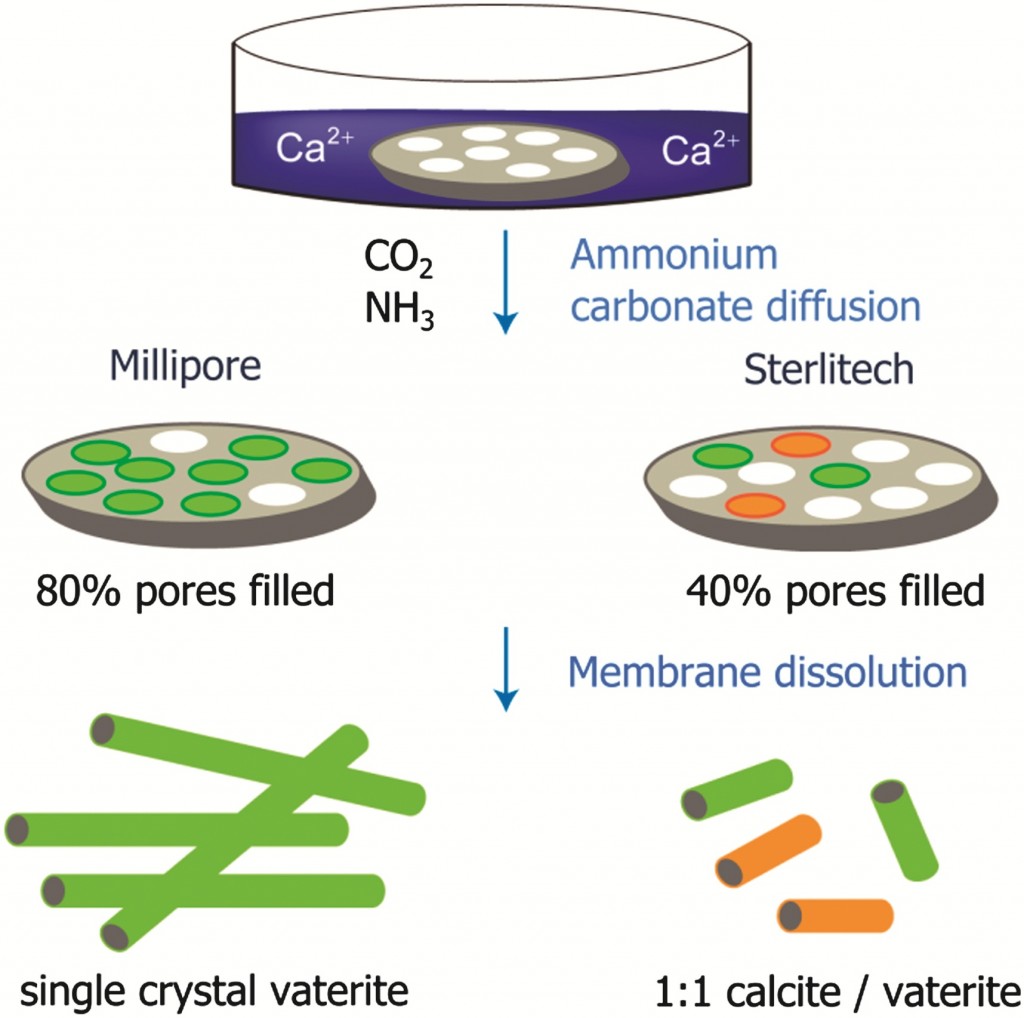The mineral system CaCO3 has three crystalline polymorphs, vaterite being the thermodynamically least-stable form. Vaterite does not appear geologically, is rare as a biomineral and single crystal vaterite is particularly rare. The micrometer-sized spicules of the ascidian Herdmania momus – also known as sea squirts – has been studied in detail, showing that the spicules are single crystals of vaterite. Schenk and colleagues, at the University of Leeds, explore the processes used by organisms to generate single crystals of vaterite.
 Selected as Editors choice for literature highlights in science magazine, this communication explores the possibility that organisms use the confinement intrinsic to biomineralisation processes to generate single crystals of vaterite. CaCO3 was precipitated within the pores of track-etched membranes in the absence of additives. The membranes were purchased from different sources, Millipore and Sterlitech. Each membrane produced different results. Precipitation of CaCO3 with the Millipore membrane led to the formation of a high yield of intra-membrane particles exhibiting rod-like morphologies. Structural investigation confirmed that vaterite was the major polymorph. In contrast, the Sterlitech membranes yielded very little intra-membrane material under the same reaction conditions. The authors suggest that the differences in CaCO3 precipitation within the two different membranes must originate from variations in the environments offered by the different membrane pores. These results demonstrate that subtle changes in microenvironment can have significant effects of polymorph production. For example the selectively of vaterite over the more stable polymorph calcite, achieved in this research, is likely to derive from the contrasting nucleation environments provided within the pores.
Selected as Editors choice for literature highlights in science magazine, this communication explores the possibility that organisms use the confinement intrinsic to biomineralisation processes to generate single crystals of vaterite. CaCO3 was precipitated within the pores of track-etched membranes in the absence of additives. The membranes were purchased from different sources, Millipore and Sterlitech. Each membrane produced different results. Precipitation of CaCO3 with the Millipore membrane led to the formation of a high yield of intra-membrane particles exhibiting rod-like morphologies. Structural investigation confirmed that vaterite was the major polymorph. In contrast, the Sterlitech membranes yielded very little intra-membrane material under the same reaction conditions. The authors suggest that the differences in CaCO3 precipitation within the two different membranes must originate from variations in the environments offered by the different membrane pores. These results demonstrate that subtle changes in microenvironment can have significant effects of polymorph production. For example the selectively of vaterite over the more stable polymorph calcite, achieved in this research, is likely to derive from the contrasting nucleation environments provided within the pores.
To read the full article for free* click the link below:
Confinement stabilises single crystal vaterite rods
Anna S. Schenk, Eduardo J. Albarracin, Yi-Yeoun Kim, Johannes Ihli and Fiona C. Meldrum
DOI: 10.1039/C4CC01093K
*Access is free until the 23rd May 2014 through a registered RSC account – click here to register










